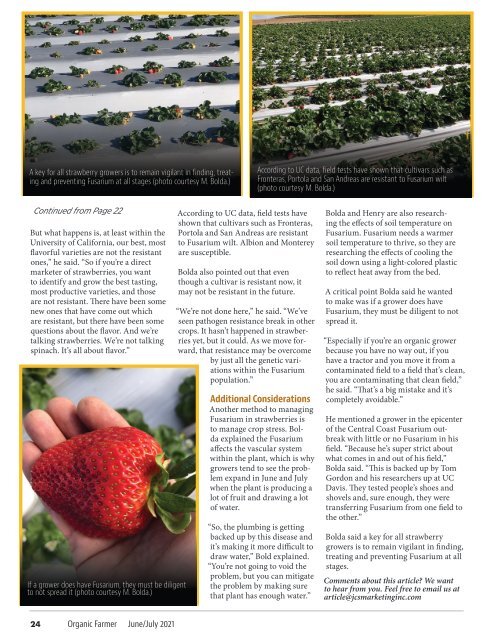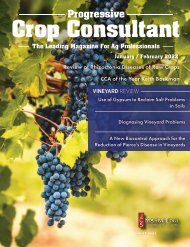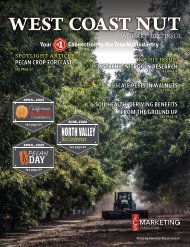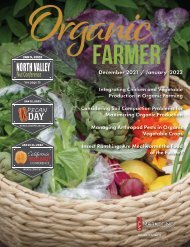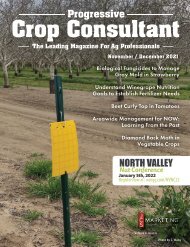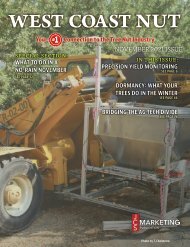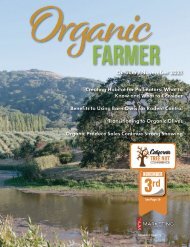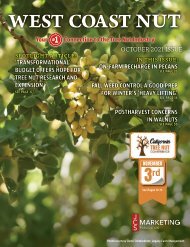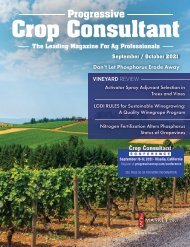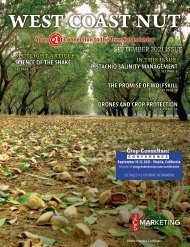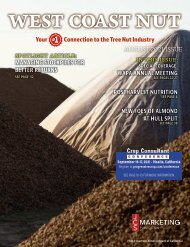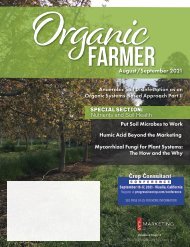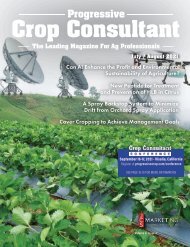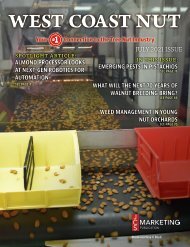Create successful ePaper yourself
Turn your PDF publications into a flip-book with our unique Google optimized e-Paper software.
A key for all strawberry growers is to remain vigilant in finding, treating<br />
and preventing Fusarium at all stages (photo courtesy M. Bolda.)<br />
According to UC data, field tests have shown that cultivars such as<br />
Fronteras, Portola and San Andreas are resistant to Fusarium wilt<br />
(photo courtesy M. Bolda.)<br />
Continued from Page 22<br />
gation, they’re losing too many plants.<br />
But what happens is, at least within the<br />
University of California, our best, most<br />
flavorful varieties are not the resistant<br />
ones,” he said. “So if you’re a direct<br />
marketer of strawberries, you want<br />
to identify and grow the best tasting,<br />
most productive varieties, and those<br />
are not resistant. There have been some<br />
new ones that have come out which<br />
are resistant, but there have been some<br />
questions about the flavor. And we’re<br />
talking strawberries. We’re not talking<br />
spinach. It’s all about flavor.”<br />
If a grower does have Fusarium, they must be diligent<br />
to not spread it (photo courtesy M. Bolda.)<br />
According to UC data, field tests have<br />
shown that cultivars such as Fronteras,<br />
Portola and San Andreas are resistant<br />
to Fusarium wilt. Albion and Monterey<br />
are susceptible.<br />
Bolda also pointed out that even<br />
though a cultivar is resistant now, it<br />
may not be resistant in the future.<br />
“We’re not done here,” he said. “We’ve<br />
seen pathogen resistance break in other<br />
crops. It hasn’t happened in strawberries<br />
yet, but it could. As we move forward,<br />
that resistance may be overcome<br />
by just all the genetic variations<br />
within the Fusarium<br />
population.”<br />
Additional Considerations<br />
Another method to managing<br />
Fusarium in strawberries is<br />
to manage crop stress. Bolda<br />
explained the Fusarium<br />
affects the vascular system<br />
within the plant, which is why<br />
growers tend to see the problem<br />
expand in <strong>June</strong> and <strong>July</strong><br />
when the plant is producing a<br />
lot of fruit and drawing a lot<br />
of water.<br />
“So, the plumbing is getting<br />
backed up by this disease and<br />
it’s making it more difficult to<br />
draw water,” Bold explained.<br />
“You’re not going to void the<br />
problem, but you can mitigate<br />
the problem by making sure<br />
that plant has enough water.”<br />
Bolda and Henry are also researching<br />
the effects of soil temperature on<br />
Fusarium. Fusarium needs a warmer<br />
soil temperature to thrive, so they are<br />
researching the effects of cooling the<br />
soil down using a light-colored plastic<br />
to reflect heat away from the bed.<br />
A critical point Bolda said he wanted<br />
to make was if a grower does have<br />
Fusarium, they must be diligent to not<br />
spread it.<br />
“Especially if you’re an organic grower<br />
because you have no way out, if you<br />
have a tractor and you move it from a<br />
contaminated field to a field that’s clean,<br />
you are contaminating that clean field,”<br />
he said. “That’s a big mistake and it’s<br />
completely avoidable.”<br />
He mentioned a grower in the epicenter<br />
of the Central Coast Fusarium outbreak<br />
with little or no Fusarium in his<br />
field. “Because he’s super strict about<br />
what comes in and out of his field,”<br />
Bolda said. “This is backed up by Tom<br />
Gordon and his researchers up at UC<br />
Davis. They tested people’s shoes and<br />
shovels and, sure enough, they were<br />
transferring Fusarium from one field to<br />
the other.”<br />
Bolda said a key for all strawberry<br />
growers is to remain vigilant in finding,<br />
treating and preventing Fusarium at all<br />
stages.<br />
Comments about this article? We want<br />
to hear from you. Feel free to email us at<br />
article@jcsmarketinginc.com<br />
24 Organic Farmer <strong>June</strong>/<strong>July</strong> <strong>2021</strong>


